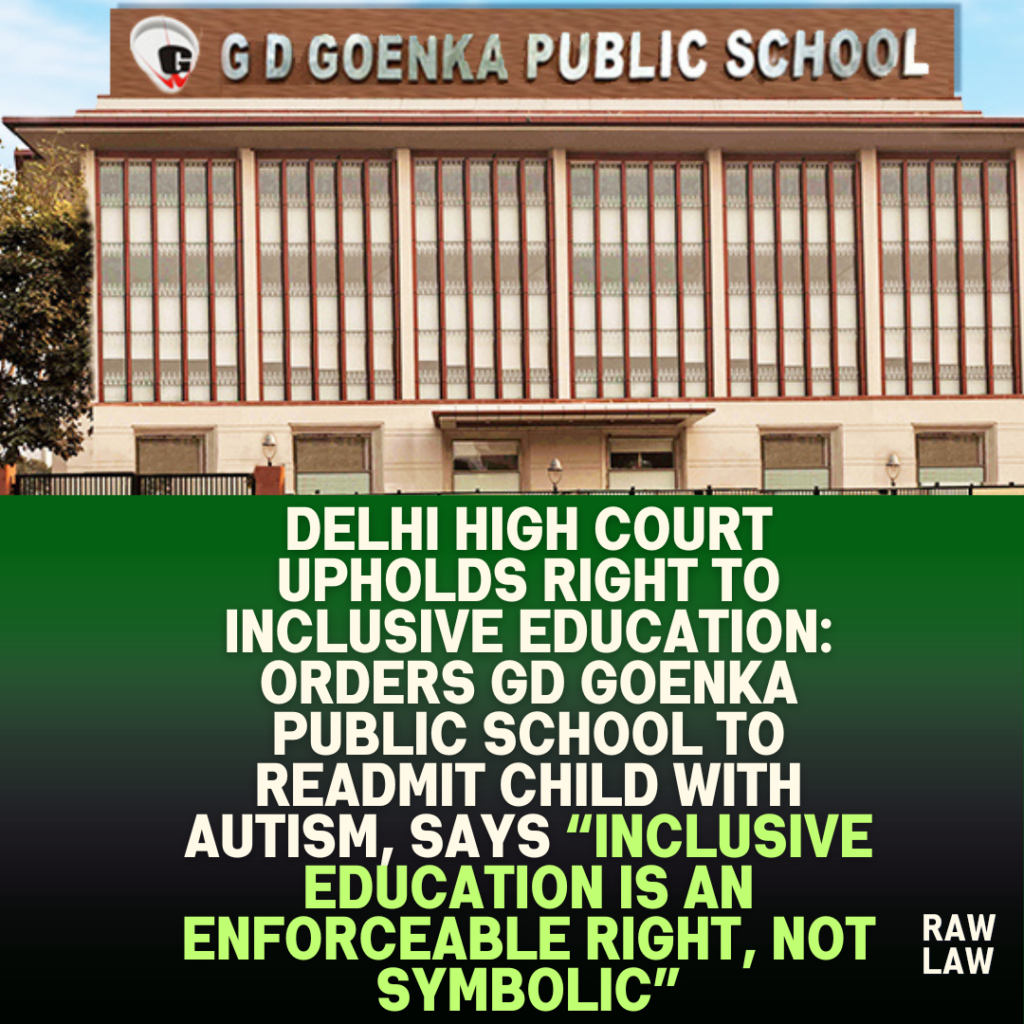Court’s Decision
The Delhi High Court directed GD Goenka Public School to readmit the petitioner (a child with autism) in Class I or age-appropriate class as a fee-paying student within two weeks, rejecting the school’s claim of non-vacancy. The Court permitted the petitioner to attend with a shadow teacher appointed by her parents, emphasizing the statutory right to inclusive education under the Rights of Persons with Disabilities Act, 2016. The Directorate of Education (DoE) was directed to monitor reintegration and ensure a non-discriminatory environment, with the school required to file a compliance affidavit within four weeks.
Facts
The petitioner, a minor child diagnosed with mild autism, was initially admitted in 2021 under the sibling category without formal diagnosis disclosure as the condition was only suspected then. Her parents shared her diagnosis with the school in 2022 and repeatedly sought support, including a shadow teacher. The school highlighted her behavioural issues and suggested withdrawal, leading to discontinuation from January 2023, despite fees paid till March 2023.
Later, the petitioner applied under the CWSN category for 2024-25 but the school resisted the allotment, claiming no vacancies and prior enrolment issues. The parents pursued legal remedies to enforce the child’s right to education in the same school with inclusive support.
Issues
- Whether a child with autism can claim re-admission in the same private school as a fee-paying student, asserting the right to inclusive education despite the school’s objections of behavioural issues, non-vacancy, and prior withdrawal.
- Whether the statutory mandates under the Rights of Persons with Disabilities Act, 2016 override institutional claims of non-vacancy to enforce inclusive education.
Petitioner’s Arguments
The petitioner argued that autism is a neurodevelopmental condition, not a mental illness. The parents had not withdrawn the child voluntarily; the school created a hostile environment, refusing requests for shadow teacher support and forcing withdrawal. The petitioner invoked Sections 16, 17, and 31 of the RPwD Act asserting the right to inclusive education, relying on the DoE-appointed committee report recommending her continuation in the same school with support.
The petitioner contended that the school’s refusal and non-cooperation violated the child’s fundamental rights and statutory entitlements under the RPwD Act and the RTE Act, 2009.
Respondent’s Arguments
The school argued:
- The child had not attended school for over a year, with no fees paid for 2023-24, amounting to voluntary withdrawal.
- There was non-disclosure of the disability during admission in 2021, vitiating the enrolment.
- No vacancies existed in Class I under either the General or CWSN category for 2024-25 or 2025-26, citing DoE circulars and draw-of-lots mechanisms.
The DoE aligned with the school’s procedural stand but expressed willingness to assist if future vacancies arose.
Analysis of the Law
The Court analysed Sections 2, 3, Sections 16, 17, and 31 of the RPwD Act , 2016, emphasizing the right to equality, non-discrimination, and inclusive education for children with disabilities. It clarified:
- Inclusive education is a statutory duty of recognized educational institutions.
- Technical objections like non-vacancy cannot defeat statutory rights, as no law rigidly restricts class sizes to deny inclusion.
- A child’s behavioural challenges should invoke institutional support, not exclusion.
Precedent Analysis
The Court relied on:
- Avni Prakash v. NTA (2021): Emphasized the statutory right to inclusive education.
- Social Jurist v. Govt. of NCT of Delhi (2009): Schools cannot deny admission to disabled children due to facility constraints.
- Rajneesh Kumar Pandey v. Union of India (2021): Mandated appropriate pupil-teacher ratios for children with disabilities.
- Pramod Arora v. LG of Delhi (2014): Addressed centralized admission processes under the CWSN category while distinguishing procedural limitations from substantive rights.
Court’s Reasoning
The Court held:
- The withdrawal was effectively forced due to the school’s failure to accommodate.
- Non-disclosure arguments were invalid, as the disability was diagnosed later, and the school had already accepted the child under its inclusive policy.
- Inclusive education rights are enforceable, and institutional reluctance cannot override a child’s statutory entitlements.
- The DoE committee’s report supporting the child’s reintegration with a shadow teacher reinforced the need for continuation in the same school.
Conclusion
The Delhi High Court ordered GD Goenka Public School to:
- Readmit the petitioner in Class I/age-appropriate class as a fee-paying student within two weeks.
- Allow a shadow teacher appointed by parents.
- Facilitate an inclusive, non-discriminatory environment under DoE monitoring.
- File a compliance affidavit within four weeks.
The petition was disposed of with these binding directions, reaffirming the right to inclusive education as enforceable and not merely symbolic.
Implications
- Reaffirms strict judicial enforcement of inclusive education rights under the RPwD Act.
- Clarifies that technical objections like non-vacancy and behavioural challenges cannot override a disabled child’s statutory rights.
- Strengthens parents’ ability to seek court-enforced readmission with support structures like shadow teachers in private schools.
- Guides private schools on adopting a supportive, not exclusionary, approach for children with disabilities.
FAQs
1. Can a private school refuse a child with autism admission due to behavioural issues?
No, under the RPwD Act, schools cannot refuse on this ground and must provide accommodations, including shadow teachers.
2. Is inclusive education under the Disabilities Act legally enforceable?
Yes, the Delhi High Court held that inclusive education is not symbolic but enforceable, overriding institutional objections.
3. What if a school claims there is no vacancy for a child with disabilities?
The judgment clarifies that seat availability cannot defeat a child’s statutory right to inclusive education.
